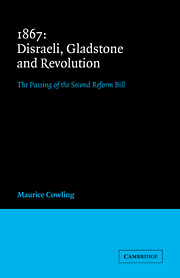Book contents
- Frontmatter
- Contents
- Preface
- Dedication
- Introduction
- I Prelude
- II Preliminary: The uprooting of the Whigs
- III The cornering of the Conservative party
- IV The reassertion of Conservative policy
- V The destruction of Liberal unity
- VI The victory of Disraeli
- VII The public agitation
- VIII The acceptance of Hodgkinson's amendment
- IX Conclusion: Palmerston's mantle
- Epilogue: The limitations of historical knowledge
- Appendixes
- Bibliography
- Notes
- Index
Epilogue: The limitations of historical knowledge
Published online by Cambridge University Press: 18 December 2009
- Frontmatter
- Contents
- Preface
- Dedication
- Introduction
- I Prelude
- II Preliminary: The uprooting of the Whigs
- III The cornering of the Conservative party
- IV The reassertion of Conservative policy
- V The destruction of Liberal unity
- VI The victory of Disraeli
- VII The public agitation
- VIII The acceptance of Hodgkinson's amendment
- IX Conclusion: Palmerston's mantle
- Epilogue: The limitations of historical knowledge
- Appendixes
- Bibliography
- Notes
- Index
Summary
‘I will explain to you…all the arts by which [I passed the Reform bill]… All the black devices I applied were simply these—upon every question I took my own party into my confidence and when I had to appeal to an independent opposition, I remembered at all times that they were men of sense and gentlemen.’
Disraeli to working-men's meeting in Edinburgh, October 30 1867 (The Times, October 31)The reader who has read thus far will want to know what right one has to impute motive, intention and disingenuousness to the actors whose personalities we have created out of the letters and speeches which survive from the past. He will want to know by what process we speak of Gladstone desiring, Disraeli wishing or Derby declining to make this decision or that. He will ask how certain we are of the existence of the tensions we have posited, and how far they can be said to have determined the actions of the actors we have presented. He will want to know how we justify the estimate we have made of the extent to which they were affected by the context in which they worked and the movement of events of which they were a part. This chapter will explain that we cannot justify very much.
History in one sense discovers the past: in another sense it creates it. To what extent historical writing is reconstruction is a question which we are not concerned with here. But it is certainly construction—the rendering into continuous prose of as much as the material justifies of the account we have decided to give. In construction of this sort the preliminary assumptions are crucial.
- Type
- Chapter
- Information
- 1867 Disraeli, Gladstone and RevolutionThe Passing of the Second Reform Bill, pp. 311 - 340Publisher: Cambridge University PressPrint publication year: 1967



